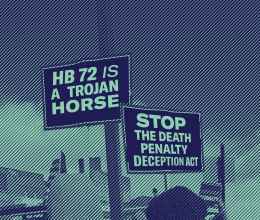COLUMBUS, OH- A decision by the Ohio Supreme Court on Wednesday ruled for the first time that a jury cannot discount the background of a defendant when they decide whether to sentence them to death. In an opinion by Justice Lanzinger in the case of State v. Tenace, the Court for the first time reversed a death sentence based on the extraordinarily troubled life of the defendant.
“This is a first,” said ACLU of Ohio Legal Director Jeffrey Gamso who as a private attorney has represented Tenace since 1994 and along with Dayton attorney Gary Crim argued the case in the Ohio Supreme Court.
Gamso continued, “Never before, in well over two hundred death penalty decisions, has the court acknowledged what the law requires: that a defendant’s history, character, and background can be so horrific that a death sentence cannot fairly be imposed.”
According to the United States Constitution and Ohio’s death penalty statute, if a death penalty defendant has experienced an extraordinarily damaging childhood, these facts must be considered when they are sentenced for the crime.
Previously, the Ohio Supreme Court has limited that law, applying it only to cases in which the defendant suffered from serious mental illnesses that directly caused their crimes. The court’s decision Wednesday recognized that the law demanded more, that traumatic childhood alone could justify a sentence of life in prison rather than the death penalty.
“The court did not try to excuse the actions of Mr. Tenace, but took into consideration the truly horrific life he had,” Gamso observed. “As a child, he was taught by his parents to use drugs and commit crimes. He was a victim of terrible abuse. His brother and sister are both in prison.”
In her opinion, Justice Lanzinger called Tenace “doomed.” Another Justice noted that if there was ever a case in which the childhood of a defendant should be considered when sentencing them, this case was it.
Gamso concluded, “Hopefully, this opens the door for others who have been failed by society to receive some sort of recognition for the tremendous obstacles in their life. This is not about excusing or minimizing their crimes, but showing compassion and fairness and recognizing that we are the products of our pasts."








